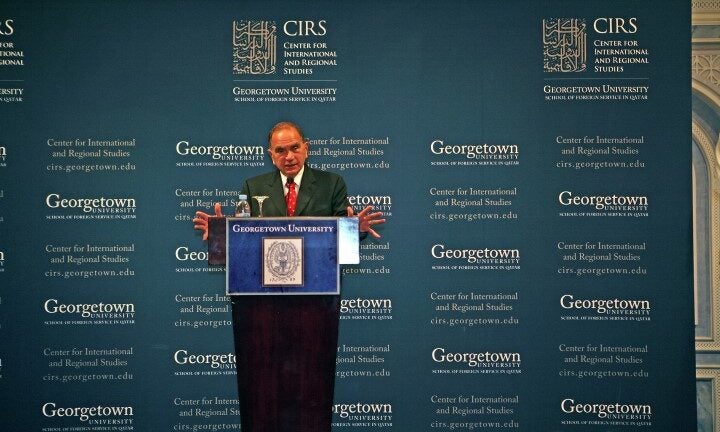American Studies, Dialogue Series, Regional Studies
Edward Djerejian on U.S. Policy Toward the Arab & Muslim World

Drawing on his career of experience as a diplomat, former U.S. ambassador to Syria and Israel, Edward Djerejian, offered his insights and analysis of current foreign policy challenges facing the United States in the Middle East and South Asia to a full house at the Diplomatic Club in Doha on March 17, 2009.
Ambassador Djerejian, a graduate of the School of Foreign Service at Georgetown University, is currently the Director of the James A. Baker III Institute for Public Policy at Rice University. He has served in eight U.S. administrations from John Kennedy to Bill Clinton and has filled such posts as Deputy Assistant Secretary of Near Eastern and South Asian Affairs and ambassador to Syria and Israel. In 2008, Djererjian published a book entitled Danger and Opportunity: An American Ambassador’s Journey through the Middle East, detailing his experiences in the region.
In his lecture, Ambassador Djerejian noted that “the challenges that the Obama administration faces in its foreign policy toward the Arab and Muslim world are comparably great.” He addressed U.S. policy challenges in Israel-Palestine, Iraq, Iran, Afghanistan, and Pakistan, stressing that the politics of the region are often interconnected and what happens in one state can have a significant impact on another. Specifically, he pointed to the centrality of Israel-Palestine conflict, saying that the so-called neo-conservatives erred when they claimed that the road to peace in the region ran through Baghdad rather than Jerusalem. While he hailed some positive developments in Israeli-Arab relations, including the Madrid conference of 1991, in which Arabs and Israelis negotiated face-to-face for the first time, Djerejian said that it was essential that U.S. policy be aimed at a resolution of the conflict. He added that the term “peace process,” was not useful as it implies that there is no end in sight, and he therefore preferred to concentrate on a more results-oriented vision.
In his discussion of U.S. foreign policy toward Iraq, Djerejian stressed that the Bush administration made a serious error in ignoring a key recommendation of the Iraq Study Group to engage diplomatically its adversaries, Iran and Syria. The United States has many common interests with Iran in particular, among them cooperation on Iraq, Afghanistan, and energy. Djerejian suggested that all issues be on the table in talks with Iran, except for the threat of regime change. Military action against Iran would be a huge failure, he said.
On Afghanistan and Pakistan, the former ambassador suggested that U.S. policy suffers from a lack of coherence in approach, in part, due to the distraction of the war in Iraq. He proposed that the Obama administration lower its military goals and expectations in Afghanistan, partly out of recognition that, historically, the country is not easily controlled by foreign powers. Additionally, the United States should recommit to building roads and infrastructure and providing basic services and security to the Afghan people, given that the Taliban thrives in places where these essentials are missing.
Addressing the region as a whole, Ambassador Djerejian argued that it “is fraught with critical issues – unresolved – that need the attention of the people of the region in the first instance, but also, the hopefully constructive involvement of the outside world.” He argued that “overarching all of these specific issues, in my view, is the struggle of ideas within the Muslim world and by that I mean the struggle between the forces of moderation and the forces of extremism and in the middle, those – especially the younger generations – who haven’t made up their mind which way to go. This is a struggle of ideas that will determine the future of the Arab world.”
Djerejian concluded by noting that the problem for U.S. democracy promotion efforts is the possibility that radical Islamist parties will use elections to assume power then overthrow the democratic system. The United States should therefore take a careful approach to promote a culture of democracy rather than trying to impose an American-modeled democratic system on foreign cultures. He stressed education as an important building-block in such a promotion of democracy, highlighting the role education played in Arab high society over the centuries and citing Qatar’s Education City as an example of rising new models of education in the region.
Summary by Alex Schank. Alex graduated from Georgetown University in 2008 with a major in English and minors in Arabic and government. As an undergraduate, he studied abroad in Cairo, Egypt and completed an internship with the U.S. Department of State in Doha, Qatar. Alex is currently studying Arabic at Qatar University.